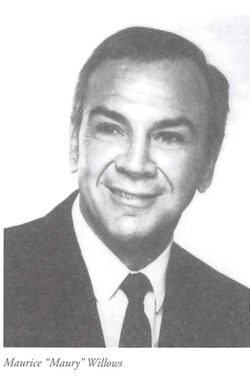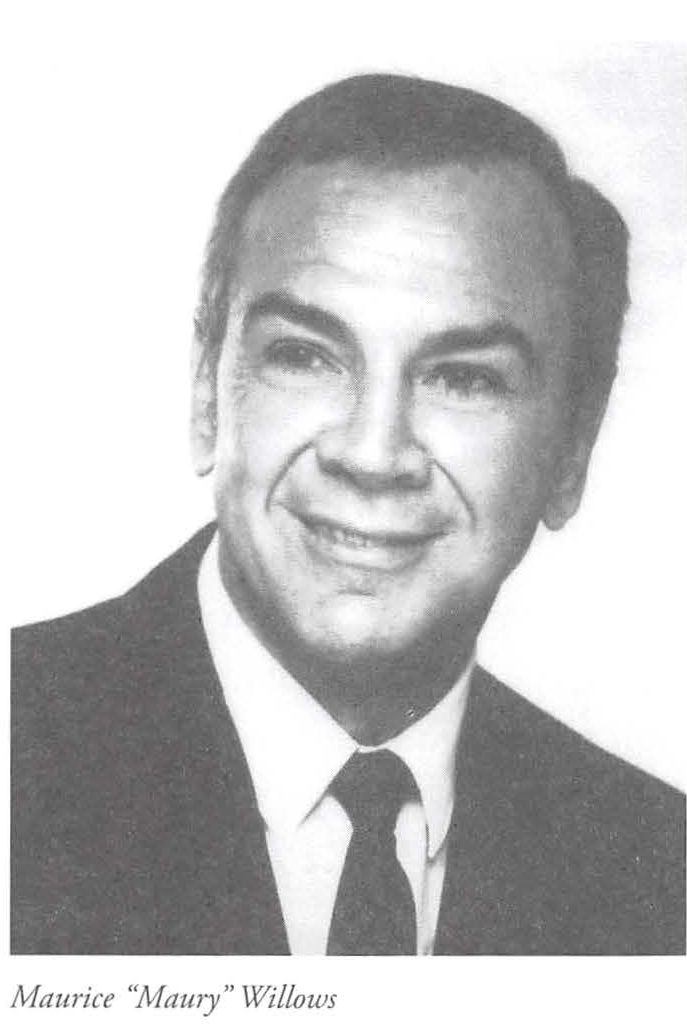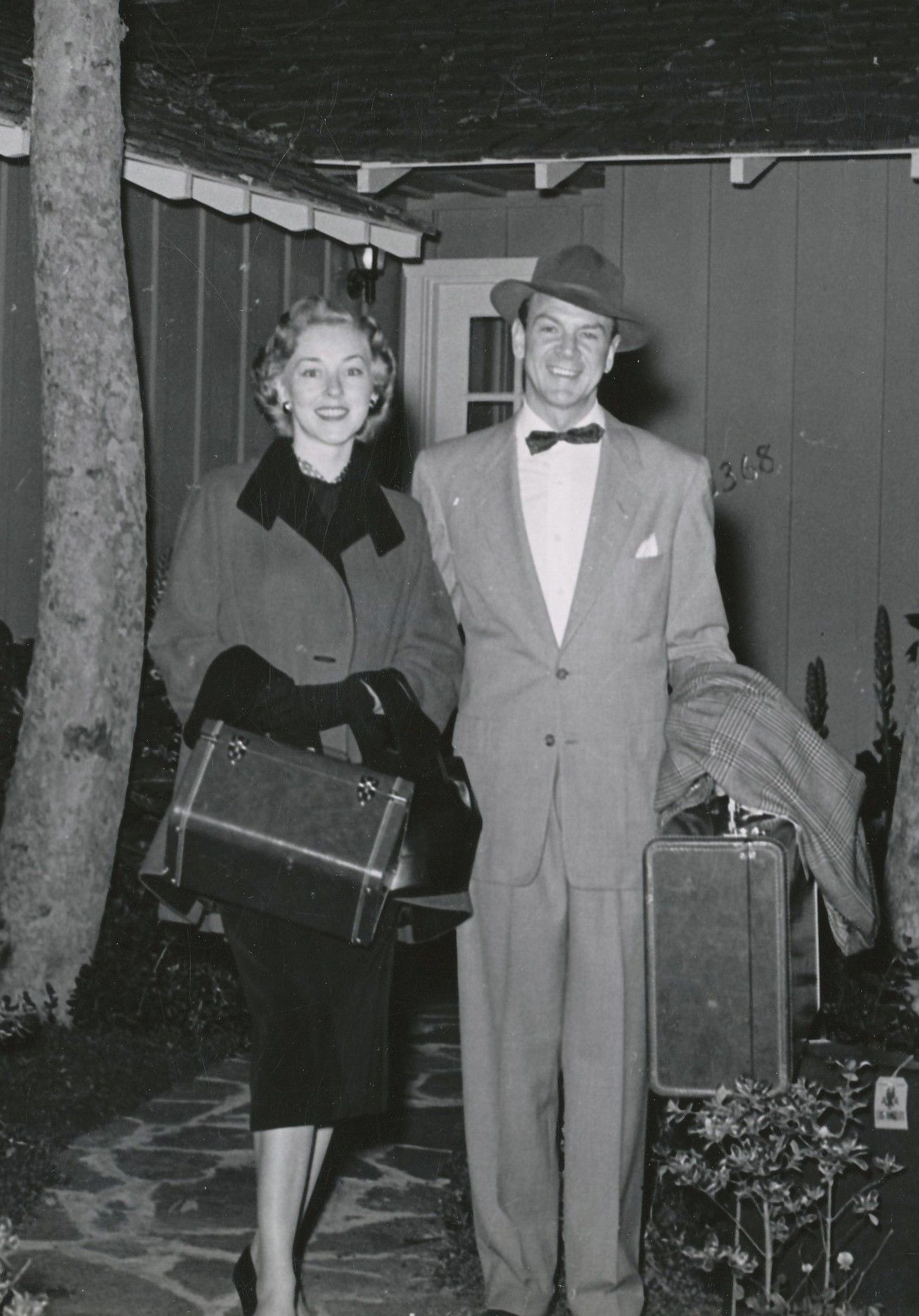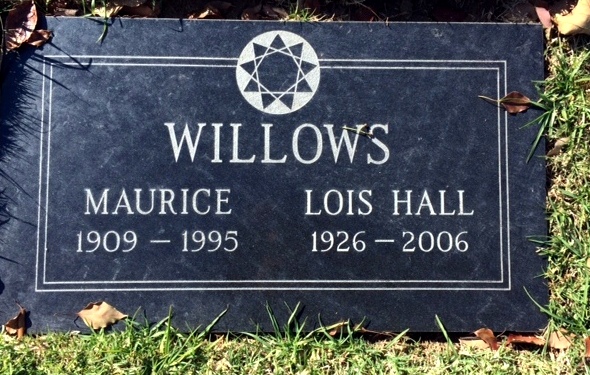1909-1995
Maurice Sheppard Willows Jr., or Maury, as he liked to be called, first heard of the Baha'i Faith at a fireside he had been invited to at the home of Laura Platt in Los Angeles. The speaker was Virginia Foster, and Maury became so enamored
with the message that he asked Virginia if she would speak to some of his friends. Thus he started hosting firesides before he enrolled as a Baha'i. He did not have much success in teaching until he wrote to Shoghi Effendi. On January 1, 1949, he
declared his belief in Baha'u'llah and stated in his letter to the Guardian that he and his friend, Churchill Ross, were holding firesides with the hope of attracting others. In response the Guardian's secretary wrote that Shoghi Effendi was glad that Maury "intended to do something about being a follower of Baha'u'llah and not just bask in [his] own spiritual good fortune." A postscript in Shoghi Effendi's own hand read, "Assuring you of my fervent prayers for your success and spiritual advancement. Your true brother, Shoghi." From that date onward the firesides were a success, and
Maury hosted them regularly for more than forty-seven years. Maury was born in Birmingham, Alabama, on August 13, 1909, and named
after his father who was a great humanitarian and pioneer social worker. Notably
Maurice Sr. was "the compassionate director" of the American Red Cross in Tulsa, Oklahoma, during the horrendous race riots of 1921 that were described as being the worst civil disturbance in American history since the Civil War. Maurice Sr.'s work was credited with saving many lives, and it has been reported that in the midst of this degrading turmoil, the relief efforts of the American Red Cross under Maurice Sr.'s supervision "provided a model of human behavior at its best." In his final
report Maurice Willows Sr. indicated that the total number of riot fatalities may have mounted as high as three hundred. Eighteen deaths alone occurred at what was then called the Maurice Willows Hospital. Young Maury would have been an impressionable eleven-year-old. He never forgot
the carnage, his father's sense of horror at the injustices perpetrated, nor his mother's
tenderness while physically tending to the victims.
While attending Oklahoma University Maury discovered that he had talent as an actor. By the late 1920s he had made his way to Hollywood where he worked as a bit player at Universal Studios appearing in several movies including the classic All Quiet on the Western Front (1930). Later he was loaned to RKO Studios for Babes in Toyland (1934) with Laurel and Hardy. He also worked under contract to Fox Studios. Maury appeared in the stage productions of Young Sinners in Santa Barbara and San Francisco. At the Palm Springs Tennis Club Maury was befriended by Templeton Crocker, heir to a San Franciscan family fortune.
"Temp," as his friends called him, had had a n8 foot schooner built that he had called the Zaca --a vessel he sailed around the world. Temp was writing a book about his adventure and needed someone to help type and edit it. Maury was offered the job. In the meantime Temp was planning a second trip, this time a scientific expedition to the Galapagos Islands and the coasts of Central and South America. He would take along several scientists including the well-known American naturalist, explorer, and author, William Beebe. In order to go along as an assistant, Maury was tutored
in collecting at the Academy of Sciences in San Francisco. As it turned out Maury went on seven expeditions on the Zaca to Central and South America and to the South Pacific, six of which were sponsored by the American Museum of Natural History, the other by the Bishop Museum in Honolulu. Each voyage was of six months' duration. The other six months were spent in preparation
for the next trip and in traveling to Europe to exchange artifacts with the British Museum and with the Trocadero in Paris. Maury would write, "My advice to anyone who wants to make the most out of travel is to go on a splendidly outfitted yacht with a multimillionaire with impeccable taste in everything." Temp also paid for the trips to Europe.
World War II put an end to this way of life. Maury enlisted in the Navy, entering as a quartermaster and rising in rank to lieutenant commander in four years. After the war Maury found that everything had changed. He wrote, "Things that used to
be exciting and fun didn't have the same appeal." His friend Templeton Crocker had died, acting no longer interested him, and Maury could not find a job that suited him. It was during this time of restlessness that he and Churchill Ross happened upon the Baha'i Faith. He wrote: As much as I had always been skeptical, especially about religion, I finally came to the conclusion that this was it! This was really what I had been looking for all my life. It sounds a bit corny I know, but that's the way it was. I knew that since I had found and proved it to myself, [that] if I did not accept it
wholeheartedly, I would be a hypocrite of the first order and would have to
admit that I was not truly searching for the truth. Now that situation leads to a
dilemma. Either you do or you don't. You are or you are not.
Maury did and he was.
In 1953 Maury married Lois Hall, a third-generation American Baha'i who was
described by a friend as having "beauty, wit, wisdom and warmth rolled into one character."
She became the hostess of Maury's regular firesides of which it has been said,
"there is almost no place on the planet untouched by the Willows firesides, as it
has generated pioneers, traveling teachers, and lovers of Bahau'llah too numerous
to count."
Pioneers were being sought to go to the Hawaiian Islands, which were among the
territories to be consolidated during the Ten Year Crusade. In 1960 the Willows
were able to help fill this goal. Maury supported the family by working as sales
manager for the Encyclopedia Britannica's "Great Books of the Western World" program,
and he supported the work of the Faith by giving firesides, speaking at
deepening classes, and serving on committees.
Maury was on the Local Spiritual Assembly of Honolulu for a number of
years, often as its chairman, and Lois was elected to the first National Spiritual
Assembly of the Hawaiian Islands when it was formed in 1964.
After ten years in Hawaii the Willows returned to their home on Benedict
Canyon Drive in Beverly Hills, California, which they had been renting out. They
had three daughters, Deborah, Kimberly, and Christina, and they created a home
in which, as one friend noted, there was "limitless radiance and joy"-a home noted
for "outstanding hospitality." The heart of activity around which all of this revolved
was their Friday night fireside.
Maury served on many committees and on the Local Spiritual Assembly of
the Baha'is of Los Angeles for many years, and he was often a delegate to the National
Convention from Southern California. He was also appointed to serve as an assistant
to an Auxiliary Board member.
Maury and Lois attended the first Baha'i World Congress held in London in 1963. In
1965 they had the privilege of going on pilgrimage to both Israel and Iran. They made
a second pilgrimage in 1981, and Maury went to the Holy Land one more time, as
a representative of the United States to the Centenary of the Ascension of Bahau'llah
during the Holy Year, 1992. Later that year the family attended the second Baha'i World
Congress in New York.
In August 1994 the Baha'is of Los Angeles held a surprise party for the
Willows. Messages of love and appreciation poured in from around the world,
including one from the Universal House of Justice which read, "Loving greetings to
the friends gathered to honor dear Maury and Lois Willows after some fifty years of
dedicated services to the Cause. May many follow the example of their much-blessed
and long-standing firesides."
In a journal entry made during the last year of his life, Maury wrote that the
things that had meant most to him in his life were beauty, excellence, his family,
and their firesides. Maury passed away on December 19, 1995.
The National Spiritual Assembly of the Baha'is of Hawaiian Islands wrote:
The entire Hawaii Baha'i Community has been reflecting on Maury
Willows and the greatness of his deeds here. Our Friday fireside at
the National Centre, which featured Maury as the regular speaker
when it began thirty-five years ago, quickly became the most productive
teaching event in the Islands, and continues to this day in lasting
tribute to Maury's prodigious efforts for the Faith in the 1960s here. We
grieve with you all in our separation from him, but it cheers our hearts
to know that your firesides continue on the other side of the Pacific
too, as we long to drop in at the Willows's fireside one Friday soon.
The Honolulu Spiritual Assembly joins us especially in sending you
our most tender love and heartfelt prayers.
On December 22, the National Assembly of the Baha'is of the United
States received the following message from the Universal House of Justice:
DEEPLY SYMPATHIZE LOSS TO AMERICAN BAHA'I COMMUNITY
MAURY WILLOWS, FAITHFUL SERVANT BAHA'U'LLAH WHOSE CONSTANCY
IN TEACHING WORK OVER SEVERAL DECADES HAS LEFT WORTHY
EXAMPLE DEVOTION CAUSE GOD. HIS SERVICES AS PIONEER
HAWAIIAN ISLANDS INDELIBLY ETCHED ANNALS FAITH. EXTEND
LOVING SYMPATHY MEMBERS HIS FAMILY. ASSURE ARDENT PRAYERS
HOLY SHRINES PROGRESS HIS SOUL THROUGHOUT DIVINE WORLDS.
1909-1995
Maurice Sheppard Willows Jr., or Maury, as he liked to be called, first heard of the Baha'i Faith at a fireside he had been invited to at the home of Laura Platt in Los Angeles. The speaker was Virginia Foster, and Maury became so enamored
with the message that he asked Virginia if she would speak to some of his friends. Thus he started hosting firesides before he enrolled as a Baha'i. He did not have much success in teaching until he wrote to Shoghi Effendi. On January 1, 1949, he
declared his belief in Baha'u'llah and stated in his letter to the Guardian that he and his friend, Churchill Ross, were holding firesides with the hope of attracting others. In response the Guardian's secretary wrote that Shoghi Effendi was glad that Maury "intended to do something about being a follower of Baha'u'llah and not just bask in [his] own spiritual good fortune." A postscript in Shoghi Effendi's own hand read, "Assuring you of my fervent prayers for your success and spiritual advancement. Your true brother, Shoghi." From that date onward the firesides were a success, and
Maury hosted them regularly for more than forty-seven years. Maury was born in Birmingham, Alabama, on August 13, 1909, and named
after his father who was a great humanitarian and pioneer social worker. Notably
Maurice Sr. was "the compassionate director" of the American Red Cross in Tulsa, Oklahoma, during the horrendous race riots of 1921 that were described as being the worst civil disturbance in American history since the Civil War. Maurice Sr.'s work was credited with saving many lives, and it has been reported that in the midst of this degrading turmoil, the relief efforts of the American Red Cross under Maurice Sr.'s supervision "provided a model of human behavior at its best." In his final
report Maurice Willows Sr. indicated that the total number of riot fatalities may have mounted as high as three hundred. Eighteen deaths alone occurred at what was then called the Maurice Willows Hospital. Young Maury would have been an impressionable eleven-year-old. He never forgot
the carnage, his father's sense of horror at the injustices perpetrated, nor his mother's
tenderness while physically tending to the victims.
While attending Oklahoma University Maury discovered that he had talent as an actor. By the late 1920s he had made his way to Hollywood where he worked as a bit player at Universal Studios appearing in several movies including the classic All Quiet on the Western Front (1930). Later he was loaned to RKO Studios for Babes in Toyland (1934) with Laurel and Hardy. He also worked under contract to Fox Studios. Maury appeared in the stage productions of Young Sinners in Santa Barbara and San Francisco. At the Palm Springs Tennis Club Maury was befriended by Templeton Crocker, heir to a San Franciscan family fortune.
"Temp," as his friends called him, had had a n8 foot schooner built that he had called the Zaca --a vessel he sailed around the world. Temp was writing a book about his adventure and needed someone to help type and edit it. Maury was offered the job. In the meantime Temp was planning a second trip, this time a scientific expedition to the Galapagos Islands and the coasts of Central and South America. He would take along several scientists including the well-known American naturalist, explorer, and author, William Beebe. In order to go along as an assistant, Maury was tutored
in collecting at the Academy of Sciences in San Francisco. As it turned out Maury went on seven expeditions on the Zaca to Central and South America and to the South Pacific, six of which were sponsored by the American Museum of Natural History, the other by the Bishop Museum in Honolulu. Each voyage was of six months' duration. The other six months were spent in preparation
for the next trip and in traveling to Europe to exchange artifacts with the British Museum and with the Trocadero in Paris. Maury would write, "My advice to anyone who wants to make the most out of travel is to go on a splendidly outfitted yacht with a multimillionaire with impeccable taste in everything." Temp also paid for the trips to Europe.
World War II put an end to this way of life. Maury enlisted in the Navy, entering as a quartermaster and rising in rank to lieutenant commander in four years. After the war Maury found that everything had changed. He wrote, "Things that used to
be exciting and fun didn't have the same appeal." His friend Templeton Crocker had died, acting no longer interested him, and Maury could not find a job that suited him. It was during this time of restlessness that he and Churchill Ross happened upon the Baha'i Faith. He wrote: As much as I had always been skeptical, especially about religion, I finally came to the conclusion that this was it! This was really what I had been looking for all my life. It sounds a bit corny I know, but that's the way it was. I knew that since I had found and proved it to myself, [that] if I did not accept it
wholeheartedly, I would be a hypocrite of the first order and would have to
admit that I was not truly searching for the truth. Now that situation leads to a
dilemma. Either you do or you don't. You are or you are not.
Maury did and he was.
In 1953 Maury married Lois Hall, a third-generation American Baha'i who was
described by a friend as having "beauty, wit, wisdom and warmth rolled into one character."
She became the hostess of Maury's regular firesides of which it has been said,
"there is almost no place on the planet untouched by the Willows firesides, as it
has generated pioneers, traveling teachers, and lovers of Bahau'llah too numerous
to count."
Pioneers were being sought to go to the Hawaiian Islands, which were among the
territories to be consolidated during the Ten Year Crusade. In 1960 the Willows
were able to help fill this goal. Maury supported the family by working as sales
manager for the Encyclopedia Britannica's "Great Books of the Western World" program,
and he supported the work of the Faith by giving firesides, speaking at
deepening classes, and serving on committees.
Maury was on the Local Spiritual Assembly of Honolulu for a number of
years, often as its chairman, and Lois was elected to the first National Spiritual
Assembly of the Hawaiian Islands when it was formed in 1964.
After ten years in Hawaii the Willows returned to their home on Benedict
Canyon Drive in Beverly Hills, California, which they had been renting out. They
had three daughters, Deborah, Kimberly, and Christina, and they created a home
in which, as one friend noted, there was "limitless radiance and joy"-a home noted
for "outstanding hospitality." The heart of activity around which all of this revolved
was their Friday night fireside.
Maury served on many committees and on the Local Spiritual Assembly of
the Baha'is of Los Angeles for many years, and he was often a delegate to the National
Convention from Southern California. He was also appointed to serve as an assistant
to an Auxiliary Board member.
Maury and Lois attended the first Baha'i World Congress held in London in 1963. In
1965 they had the privilege of going on pilgrimage to both Israel and Iran. They made
a second pilgrimage in 1981, and Maury went to the Holy Land one more time, as
a representative of the United States to the Centenary of the Ascension of Bahau'llah
during the Holy Year, 1992. Later that year the family attended the second Baha'i World
Congress in New York.
In August 1994 the Baha'is of Los Angeles held a surprise party for the
Willows. Messages of love and appreciation poured in from around the world,
including one from the Universal House of Justice which read, "Loving greetings to
the friends gathered to honor dear Maury and Lois Willows after some fifty years of
dedicated services to the Cause. May many follow the example of their much-blessed
and long-standing firesides."
In a journal entry made during the last year of his life, Maury wrote that the
things that had meant most to him in his life were beauty, excellence, his family,
and their firesides. Maury passed away on December 19, 1995.
The National Spiritual Assembly of the Baha'is of Hawaiian Islands wrote:
The entire Hawaii Baha'i Community has been reflecting on Maury
Willows and the greatness of his deeds here. Our Friday fireside at
the National Centre, which featured Maury as the regular speaker
when it began thirty-five years ago, quickly became the most productive
teaching event in the Islands, and continues to this day in lasting
tribute to Maury's prodigious efforts for the Faith in the 1960s here. We
grieve with you all in our separation from him, but it cheers our hearts
to know that your firesides continue on the other side of the Pacific
too, as we long to drop in at the Willows's fireside one Friday soon.
The Honolulu Spiritual Assembly joins us especially in sending you
our most tender love and heartfelt prayers.
On December 22, the National Assembly of the Baha'is of the United
States received the following message from the Universal House of Justice:
DEEPLY SYMPATHIZE LOSS TO AMERICAN BAHA'I COMMUNITY
MAURY WILLOWS, FAITHFUL SERVANT BAHA'U'LLAH WHOSE CONSTANCY
IN TEACHING WORK OVER SEVERAL DECADES HAS LEFT WORTHY
EXAMPLE DEVOTION CAUSE GOD. HIS SERVICES AS PIONEER
HAWAIIAN ISLANDS INDELIBLY ETCHED ANNALS FAITH. EXTEND
LOVING SYMPATHY MEMBERS HIS FAMILY. ASSURE ARDENT PRAYERS
HOLY SHRINES PROGRESS HIS SOUL THROUGHOUT DIVINE WORLDS.
Family Members
Sponsored by Ancestry
Advertisement
Explore more
Sponsored by Ancestry
Advertisement







